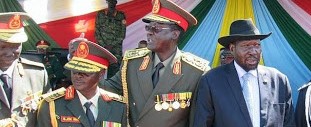A new report by the US-based Sentry group raises red flags on risks of major corruption by high ranking military leaders in South Sudan.
The Sentry, a group co-founded by actor George Clooney and activist John Prendergast, reveals that South Sudan’s last four army chiefs of staff, four of the highest-ranking military leaders, and three opposition militia leaders engaged in business activities demonstrating red flags for money laundering and corruption.
The new report, “Making a Killing: South Sudanese Military Leaders’ Wealth, Explained,” comes as South Sudan faces a first wave of COVID-19 cases with medical infrastructure and response capacities already stressed by civil war and weakened by corruption.
The report released on Wednesday examines the commercial and financial activities of former army chiefs of staff Gabriel Jok Riak, James Hoth Mai, Paul Malong Awan, and Oyay Deng Ajak, along with senior military officers Salva Mathok, Bol Akot Bol, Garang Mabil, and Marial Chanuong.
General Johnson Juma Okot replaced General Gabriel Jok Riak as chief of staff on May 11, 2020.
The report stated that General Juma Okot has also led troops who committed mass violence against civilians, including sexual and gender-based crimes. It added that the newly appointed chief of staff has reportedly been involved in various corruption schemes, such as misappropriating money intended to fund food rations for his troops, leaving them to loot as a means to sustain themselves.
Militia leaders linked to major instances of violence both before and during the civil war that ended in February 2020—Gathoth Gatkuoth Hothnyang, Johnson Olony, and David Yau Yau—are also profiled in the investigative report.
According to the new report, each of these military figures has corporate holdings in South Sudan with possible conflicts of interest, connections to the international financial system, or indicators of corruption and money laundering.
“Except for Hoth Mai and Ajak, these men have committed egregious human rights violations with near total impunity since the country’s independence, according to the United Nations and the African Union,” the report said.
It added, “Documents reviewed by The Sentry indicate that they exploited their positions of power to empty the state’s coffers and weaken its institutions with little accountability for this corruption or for the human rights violations they perpetrated.”
“Many of these men share personal or commercial ties with President Salva Kiir, who regularly intervenes in legal proceedings targeting his staunchest friends and allies.”
The report called upon the international community to sustain network sanctions, improve anti-money laundering measures and asset seizure and recovery efforts, and increase domestic and international investigations to stem the flow of the proceeds of corruption out of South Sudan.
It also underscored that anti-corruption measures must be at the heart of any security reform program that hopes to incentivize peace in South Sudan.
The Sentry urged South Sudan’s transitional government to establish and empower a hybrid anti-corruption commission to prosecute crimes committed during the civil war, as stipulated by the September 2018 peace agreement.
“If the government fails to establish the commission, the international community should exert pressure and help stand up a hybrid court to hold perpetrators accountable for gross human rights violations and economic crimes,” it added.
Army spokesman Lul Ruai Koang couldn’t immediately be reached for comment.




